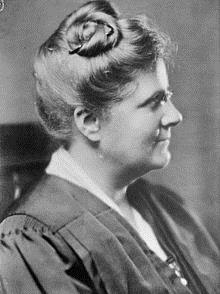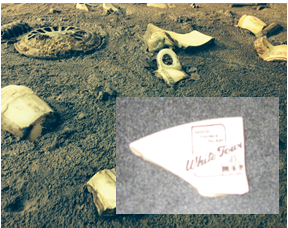
If you happen to be in the Boston area this August, and you are sick of the Freedom Trail, here’s an idea for a little trademark trail. Start in Cambridge at Moody’s Falafel Palace and head downtown past Kneeland Street to the waterfront. Then hop on a Harbor Island ferry and get off at Spectacle Island, where a piece of a vintage White Tower Hamburger plate recently washed up on the beach.
The Rise of the Castle
Upton Sinclair’s 1906 novel, The Jungle, discouraged many Americans from eating ground beef, but the owners of White Castle set out to change that. Founded in 1921 in Kansas, the White Castle restaurants featured a white-washed castle exterior, and a white and steel inside décor, to emphasize cleanliness. The 5 cent burgers were a hit, and dozens of White Castle outlets began opening around the country.
White Castle’s success bred many imitators, the most prolific of which was the White Tower burger chain. Founded in Milwaukee in 1926, White Tower poached White Castle employees to learn its business methods and liberally copied from White Castle’s medieval-ish trade dress, including the crenellated building design. White Tower even used a slogan evocative of White Castle’s, replacing “Buy ‘Em By the Sack” with “Take Home a Bagful.”
White Tower v. White Castle

By 1937, White Castle had already brought a trademark action against White Tower, which was pending in Minnesota. White Tower, apparently unhappy with that venue, cast around for a more favorable forum. It settled on Michigan, primarily because White Tower had opened up a restaurant in Detroit before White Castle. White Tower filed suit in the Eastern District of Michigan, alleging unfair competition and claiming that it had priority over the name and castle-like building design in Detroit. White Castle filed counterclaims, and both parties asked for an injunction.
The District Court sided with White Castle and found that, even though White Tower opened a store in Detroit first, the widespread White Castle fame had preceded that store, traveling down the highways of America in the bellies of satisfied customers and creating good will in Detroit by word of mouth before either company had an outlet there. Additionally, the Court found that Detroit was within White Castle’s normal scope of expansion. White Castle’s request for injunctive relief was allowed.
White Tower appealed to the Sixth Circuit, citing the principle that, where a junior user innocently builds a business in a market remote from the senior user, the junior user may not be restrained in that market. However, the legendary Judge Florence Ellinwood Allen (the first woman to serve as a Circuit Court of Appeals judge, and the first woman to serve as a State Supreme Court justice), held that there was nothing “innocent” about White Tower’s pilfered business model. The Sixth Circuit affirmed.
Following the Supreme Court’s denial of White Tower’s petition for writ of certiorari, the parties entered into a settlement agreement. White Tower was permitted to continue to use its name (for a license fee of approximately $80,000) but would have to abandon certain aspects of its trade dress, including the crenellated building design. Most White Tower restaurants stuck around under this arrangement, and the chain actually grew. However, White Tower eventually got out of the restaurant business and transformed itself into the Tombrock real estate company.
The Boston Trademark Trail

It is not entirely clear to this author whether Moody’s Falafel Palace in Cambridge was once a White Castle or a White Tower. If you go to the current owners’
website, you will find links to articles making both claims. Because the building retained its crenellated roof, it was probably a White Castle. By contrast, a similar building at 20 Kneeland Street in Boston’s Chinatown has lost its crenellation, marking it as a former White Tower.
So, if you own a restaurant in Boston in the 1930’s and suddenly have to change your trade dress, what do you do with all your old plates and cups? You dump them on Spectacle Island, of course, in the middle of Boston Harbor. Where else?
Spectacle Island was once a bucolic oasis but, by the 1930’s, it had come to serve as a massive trash receptacle. It was so full of trash by the 1950’s that, after a bulldozer actually disappeared into the mountain of rubbish, officials simply abandoned the island to posterity. However, in 1992, excavated dirt from the Big Dig was used to cap the rubbish and resurface the island. It is now a gorgeous 105 acre public park.

But a park with twist. The old trash still occasionally works its way out of the island and washes up on the beach. As a result, antique beachcombing has become one of the island’s main attractions. The island’s shores are scattered with beautiful smoothed sea glass, old apothecary bottles, shards of fine china, and tantalizing vignettes of once-famous brand names now literally ground into the dust.
This includes the White Tower plate shard which, after being photographed and spending some time in the visitors’ center, was apparently “released back into the wild” for someone else to find. So, if you are a trademark enthusiast and decide to visit Spectacle Island, you may just find a piece of unfair competition history washed up on the beach. But be warned, park regulations will prevent you from “taking home a bagful.”